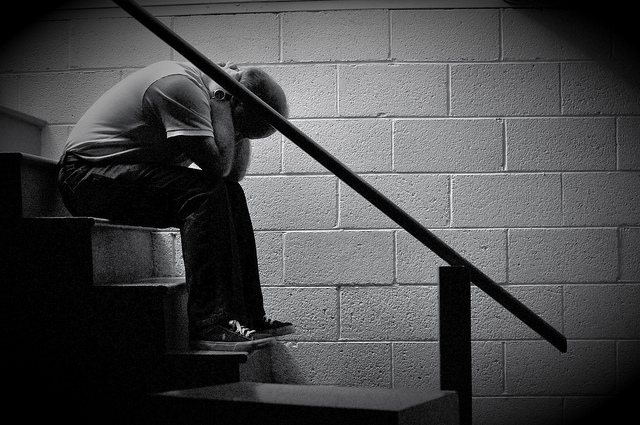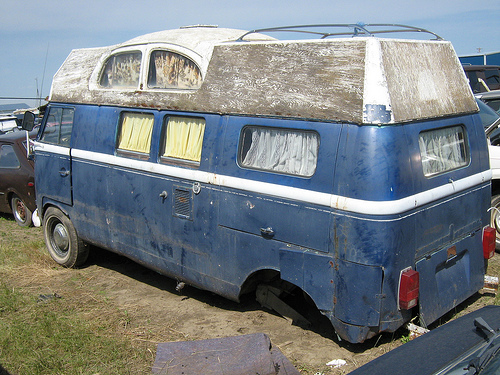Last March I had a skydiving accident. My parachute opened without a problem and I was coming in to make a normal landing. The winds were a little unusual and I let myself get distracted by other skydivers who had landed nearby. I ended up flying the canopy too fast and landed harder than I wanted. I tried to stand up, but couldn’t put weight on my foot. A friend had to help me off the landing area.
After some x-rays at the emergency room, it turned out to be more than a sprain. It was actually a fracture of the calcaneus. Which in normal English means I broke my heel. Ouch.
What do you do when life taps you on the shoulder and says, “Hey! Guess what? You need to make new plans.” A relationship ends, job loss, car accident, natural disaster. War, famine, pestilence. Okay, maybe not pestilence but you could get stuck in traffic and miss your flight. How do you deal with all that life sends your way?
Here are eight steps to help you manage the difficulties of life we all have.
1) Accept. You might get fired, the relationship is over or the house was flooded. Unless we have a time machine, we can’t change the past. All we have to work with is today and the here and now.
I was supposed to go out of town the next day for a snowboarding trip but that was no longer possible. In fact nearly every plan I had was no longer possible since I couldn’t even walk and my foot looked like a giant melon with toes. Nothing can be gained by being upset by what can’t be changed.
2) Take stock. After you accept where you are, it’s time to start figuring out the options. Something bad has happened, but how bad is it? What is it? Ask lots of questions. Do some research. Get opinions. Slowly and surely options will become more apparent.
Often the questions will outnumber the answers. That’s okay. When you answer one question, it might lead to even more questions. That’s okay too. It’s part of the process.
First I went to the emergency room and learned my foot was fractured and not sprained. Then a few days later, an orthopedic doctor said something that sounded like, “maybe this, maybe that, blah blah blah, can’t tell yet.” I needed more x-rays and a CT scan.
Finally a referral to a specialist who laid out all the options but didn’t offer any guarantees. Surgery was two weeks later and then months of physical therapy. More follow-up x-rays led to more questions. Time will tell.
Of course, your situation could be something different, such as financial or emotional, instead of medical. But “taking stock” will lead you towards your next steps.
3) Take care of the essentials. As soon as my foot was broken, my priorities changed. I wasn’t focused on taking a trip somewhere or going to the gym. I needed something as simple as a disabled parking permit. And I found some relatively healthy fast food places with drive-through windows. Pay attention to the essentials so you’ll be better able to deal with whatever obstacle life has put in your path.
4) Ask for help. I couldn’t walk and had to spend most of my time on my back with my foot on a stack of pillows. It didn’t take a genius to realize I couldn’t do everything for myself. But I did have friends and neighbors I could ask to go shopping, help with laundry, or do other errands. I even hired a personal assistant for a few hours a week to make life easier. Some people find it difficult to ask for help, but now’s not the time to be too independent. Go ahead and ask and you’ll be pleasantly surprised at how much help others are willing to provide.
5) This too shall pass. Guess what? No matter what happens, you haven’t changed. The qualities and values you have, good or bad, are still there. You might have to find new ways to use them but you’re still you.
6) Look for new opportunities. I filled up my time with less active pursuits. More reading and more time writing. Swimming was added to my days, which is good exercise and also great therapy for my foot. Some of these new habits and ideas, such as the personal assistant, have turned out to be valuable even after I could walk again. Because of the injury, I have some new and better approaches to life. Even though you can easily find the bad results from what has happened, look for new opportunities and what might be gained.
7) Don’t forget that life is still good. The surgeon is a nice guy and so is his assistant, who works magic with splints and bandages. And the people at the physical therapy office? The receptionists, technicians, therapists are all helpful and friendly. I met lots of people I wouldn’t have met otherwise. Life can feel pretty gloomy at times, and it might take a little effort, but you can still find bright spots all around.
8) Appreciate life. When life changes, we can find new things to appreciate. One of my best days in the past few months was crutching to a park bench so I could eat lunch sitting in the sun. Remember to appreciate life, even normal ordinary everyday activities, because it can all change in an instant.
***
We all have had obstacles to overcome, some major and some minor. What have you learned about how to deal with life’s setbacks?
Photo by Jeffrey






Thanks for this! It was exactly what I needed today!
Jeff, thanks for stopping by!
Good thoughts.
However, not that this comes as shocking news….but where you write:
“…because it can all change in an instant.”
You really mean…
“…because it WILL all change in an instant.”
Acceptance that we will all die is THE key to contentment.
Truly.
Gerard, good point because that is the one ultimate fact we all need to accept. Thanks!
At the age of 29, I owned 3 businesses and had a good life for myself. Oh, and I was married…
Not happily, but was still married. Somebody introduced me to pain killers. A little bit about me before I go on; I am a Navy Veteran, and I suffer(ed) from depression when I got out.
So when I tried these pain killers (for the wrong reason) I instantly found my new anti-depressant. Which very quickly proceeding with my new anti-LIFE! Like I said, this all started at the age of 29. By the Time I was 34, I lost everything, lived on the streets, graduated to Heroin and Cocaine, and was looking at 4 years in prison. But before I was given my doom, I decided to try rehab, which supported a 12 Step program. This program saved my life. Those 12 steps are a design for living. Incorporating everything you suggested as a way of life. Never to be given up. I’m happy to say that I’ve been sober, happily, since April of 2009. I was given a very small window of hope, and I took it and ran. I don’t look at the past with shame and guilt. I look at the past as my greatest asset. Helping others.
And I just want to say that The Change Blog, and people like you, also help me tremendously. Life is a dream, we either choose to live it, or choose to talk about it. I’m living it!!!
Dennis, your story is inspiring and I especially like the comment where you “look at the past as my greatest asset.” That’s a great lesson, thanks!
Thank Kurt this is a really good 8 step plan…so simple, and so obvious (I dont mean that in a deprecating way) but sometimes in a crisis we forget or arent able to step back from what is happening.
This is a good reminder. Happy healing!
Sharon
Sharon, I didn’t look at you comment as “deprecating.” :) Sometimes the obvious is hard to see or do. I know it can be for me. Thanks for the kind words!
Hi Kurt,
All great steps on moving forward. 1 & 4 are the biggies for me. If we don’t accept where we are we will always struggle to change it. And trying to recover alone is not only a lonely place to be, but we will see very thing only from a damaged perspective.
Keith, that’s true, especially what you mentioned about #4. It was one of the eight that turned out to be important in my situation. Thanks for your insights!
Unexpected events in life can change one’s outlook on life. Some sink into depression, some take them as assets to build a new life.Thanks, Kurt for the practical steps suggested to take positives out of unfortunate events.
Mahavir, yes, unexpected events can surely change one’s outlook on life. Sometimes it feels like unexpected ones are more plentiful but maybe that’s because they’re often more memorable :) Thanks for stopping by!
It’s a good reminder and eye opener.
Just when I thought I found a solution (a great business idea) I realized it already exists and has been unsuccessful. Can’t stop now…
Hello CEO Candi! I happened to watch the Benjamin Zander TED talk just last night and then noticed you mentioned it on your blog. Small world :) Maybe you can be the person to make your business idea successful? Or tweak it a little? Anyway, best wishes with what you’re working on and thanks for stopping by!
Great post to pin in front of my PC. We all get into difficulties and some times we are stuck before of the fear and uncertainties that comes with them. The steps you outlined will be a good reference to get of of the negative emotional grip. Thanks.
Stu, that’s a good way of describing what we’re trying to avoid . . .”negative emotional grip.” Thanks for the comment and I enjoyed looking at your blog! Kurt
Great points! For me, personally, the absolute key to dealing with difficulties is acceptance. Living with the belief that everything is exactly as it should be, fully accepting it, and knowing with all your faith and understanding that within each difficulty ,there is a priceless lesson to be learnt takes out the resistance and self-pity out of every difficult situation. Thus, the ‘problem’ is not a ‘problem’ any more…
Thanks Ashton! You have a great life philosophy that you summarized in only a few sentences. Glad you stopped by! Kurt
Hi from the Philippines!
I’ve been checking this blog for a while now and it never failed to give me fresh insights. I love what you said regarding “Nothing can be gained by being upset by what can’t be changed”. Whatever life may bring we still have the option to live it or not.